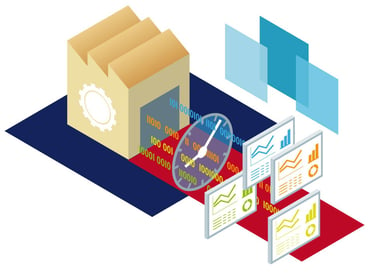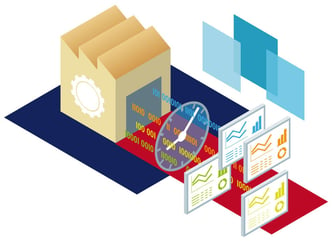How Logistics 4.0 Will Impact Supply Chain Management
Brian Hoey - August 14, 2018

 Imagine a scenario: Your company has contracted a shipper or freight forwarder to complete a delivery of parts to one of your customers. Because of extensive data-collection during your research and development for the parts, you know that high temperatures over a prolonged period of time can increase the part’s failure rate. As a result of a shipping delay, these parts spend too much time in a container that’s not properly temperature controlled.
Imagine a scenario: Your company has contracted a shipper or freight forwarder to complete a delivery of parts to one of your customers. Because of extensive data-collection during your research and development for the parts, you know that high temperatures over a prolonged period of time can increase the part’s failure rate. As a result of a shipping delay, these parts spend too much time in a container that’s not properly temperature controlled.
In the past, such circumstances would have led to a shipment of faulty parts and the inevitable headaches that typically attend supply chains failures of this kind. Money would have to be refunded and a rush order of new parts would need to be created posthaste, potentially leading to even further disruptions within your own operations. In the modern era, however, there is an alternative path that this volatile situation could take. A shipper operating in accordance with Logistics 4.0 principles would have stored your shipment in a smart container, meaning that heat and light sensors could have tracked temperature fluctuations over time, so that your customer could be alerted well in advance that their shipment was likely to be defective. Not only that, but the sensors could send an automated alert straight to your production facilities indicating the need for replacement parts—to be automatically re-planned for, produced, and transported as quickly as feasible in order to minimize the loss of both value and trust.
Though the disruption would remain, it would become known before it had wreaked havoc on your supply chain. Instead of a wide-reaching breakdown that could potential hamstring your operations and derail medium term plans, you have a networked value chain responding in an agile manner to changing conditions. While this may seem like an almost futuristic level of supply chain integration, it’s just one of the many ways that Logistics 4.0 is already impacting the world of supply chain management.
What is Logistics 4.0?
At this point you may be asking yourself, “What exactly is Logistics 4.0, and what does it have to do with my supply chain?” In answer to the first part of the query: Logistics 4.0 is, simply put, the application of Industry 4.0 principles to tasks, workflows, and environments traditionally associated with shipping, freight forwarding, and other segments of the logistics sector. By leveraging powerful technologies like the internet of things (IoT), RFID chips, smart pallets and containers, and advanced analytics software, modern logistics providers are able to be offer smart, adaptive service in an environment that is increasingly prone to disruption. These connected, digital workflows act as a compliment to (and can easily integrate with) Industry 4.0 systems, but they can provide value through increased visibility and process automation even outside that context.
Connecting the Global Supply Chain
Because this new paradigm in transport logistics comes at a moment of increased volatility and decreased cohesion across the global supply stream, its immediate task is to tackle the new challenges that are arising as a result of an increasingly globalized (i.e. diffuse) supply chain. Luckily, increased digitization and visibility, two of the cornerstones of this new logistics paradigm, are crucial to rebuilding a sense of cohesion across numerous touchpoints on the value chain. Where, in the past, a large proportion of all shipments were made along the most popular shipping routes, today’s shipments are less and less likely to keep to the well-travelled paths of the past. Though this creates challenges for those trying to move goods to their destination in the most efficient possible manner, Logistics 4.0 effectively turns this fact from a potential hurdle into an opportunity to create value. By connecting these previously under-utilized routes to a smart shipping or freight-forwarding workflow, it's possible to gather new data about them and develop a better understanding of their potential risks and benefits. Sophisticated predictive and prescriptive algorithms can then help to minimize the former and maximize the latter, turning RFID readings, IoT sensor information, and other data into actionable insights.
In this way, the diffuse global value chain becomes increasingly connected and legible. As a result, when disruptions related to traffic, weather, tariffs, or other changing conditions arise, supply chains of high levels of complexity are still able to adapt, creating new plans for routing, hub usage, truck load optimization, and other considerations at a moment’s notice.
The Rise of Anticipatory Logistics
In the short term, digital logistics will go a long way towards preserving value in the face of volatility. In the longer term, it has the potential to do much more. Specifically, by gathering large quantities of data and utilizing them in increasingly sophisticated ways, Logistics 4.0 supply chains may one day be able to power anticipatory logistics, i.e. logistics processes that anticipate customer needs before they arise. Think back to our original example of a shipment of damaged parts sending an alert to production planners that replacement parts will necessary; now imagine that instead of waiting for an alert from the smart container or truck, predictive machine learning algorithms can predict the need for increased production of replacement parts before any sign of breakdown has even been recorded. When a customer does, eventually, develop a need for replacement parts, the customer will find that the necessary stock is already in the supplier’s inventory (or even already positioned at a nearby hub or warehouse) and that the lead time for his or her order will be reduced to virtually nothing. This is just a snapshot of the type of workflow that could arise in an environment built around anticipatory logistics. When these workflows become a practical reality, it will be the early adopters of Logistics 4.0 principles who are best able to take advantage.
LATEST POSTS
- Understand Circular Economy in The Manufacturing Industry
- How Can Industry 4.0 IT Integration Be Achieved Smoothly?
- The Significance of Order Sequencing in Discrete Manufacturing
- How to improve your Supply Chain Management: The Power of Control Towers
- Optimizing Human Resource Scheduling in Manufacturing: A Technological Approach



